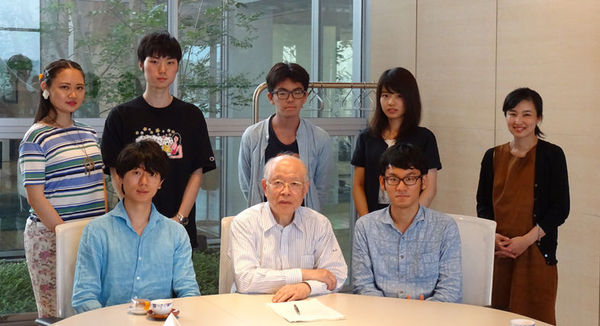Since January 2013, University Prof. Ryoji Noyori, a Nobel Laureate in Chemistry (2001), has contributed numerous articles to "Kamitsubute" in Chunichi Shimbun. Based on these articles, he holds regular academic discussions with students at Nagoya University. At the 21st Noyori Academy Salon, held on July 1, 2016, Prof. Noyori and six students from different academic fields at Nagoya University discussed the topic "Multiplication Can Create a New Value." Prof. Noyori claimed that academic interdisciplinary exchange provides an opportunity to develop new perspectives such as the multiplication of different elements in scientific formulae.

Ryuta Inukai, a first-year student at the Graduate School of Bioagricultural Sciences
What do you mean by the scientific multiplication of different elements?
Prof. Noyori
In a scientific formula, multiplication modifies the unit of elements; for example, E = mc2 in the theory of relativity explains that energy (E) is produced by the multiplication of mass (m) and speed of light (c). Even if you add elements, you can only increase the quantity; you cannot change the quality. I would suggest you to think about how a society should work in a homogeneous nation such as Japan.
Hyunggyu Jang, a freshman from Korea at the School of Engineering
I came to Japan so that I could fulfill my dream. I believe this action is the multiplication happening inside me.
Prof. Noyori
Your academic background from your home country is a valuable experience. I expect that you will accumulate more experience in Japan and develop yourself in the process.
Moe Ishida, a freshman at the School of Medicine
I believe that inspiration from various fields is essential in academia.
Prof. Noyori
Science needs sensibility. Europe originally established natural science; however, the question is why Japan is leading in science and technology today. I believe we, Japanese people, cherish our culture associated with the four beautiful seasons and traditional craftwork of Japan.
Hiroto Yamamoto, a first-year student at the Graduate School of Bioagricultural Sciences
What can scientists do to deal with the negative aspects of science and technology, such as the environmental issues faced?
Prof. Noyori
We can still make further efforts in case of the emission of CO2, for example. We have overused the limited resources available to us without thinking about the future generations. The problem is that the current society chooses market fundamentalism. Innovation because of value creation is more important than the development of technology or business-oriented commonwealth.
Daiki Saito, a freshman at the School of Science
I think the real significance of globalization can be produced by sharing our varied perspectives.
Prof. Noyori
In the first place, people in the world should have a common sense of shared human existence on earth, and then deal with environmental issues keeping in mind the survival of mankind. It is not easy to do so when various people involved; therefore, the idea of multiplication is necessary.
Akari Iwamura, a second-year student at the Graduate School of Languages and Cultures
Here, I believe humanities subjects are important to encourage such research themes among people.
Prof. Noyori
Philosophy and literature are surely important; however, students and researchers in these fields are expected to put in more effort. I am worried that the ethical component of society is not evolving in tandem with the development of industrial technology. Hence, it is necessary that a new value for society be created with scientists by appealing to their skills rather than only engaging in arguments.
Original article published in Chunichi Shimbun on July 3, 2016.